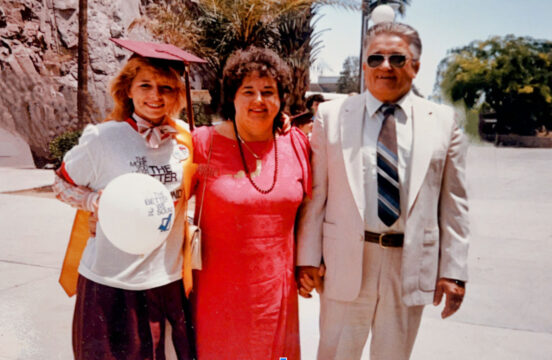When gone isn’t goodbye

🕯️ This is very personal.
An AI company reached out to me recently with an interesting offer. They’d take the photos, videos and voice recordings I have of my mom and use them to create an AI version of her. Not a slideshow or tribute video. Something interactive. When they were done, I could talk to my AI mom and have it talk back to me.
My mom passed away after a five-year battle with pancreatic cancer on Sept. 19, 2021. I say a prayer for her every morning when I wake up, and for my father, too. I know they’re reunited in heaven.
That photo above is my college graduation. I love that my parents are holding hands. As a prank, they brought me an AT&T T-shirt and balloon because I was interviewing for a job. Now you know it’s in my blood.
After my father died, my mother moved in with me when I was 27, and we became more sisters than anything else. When Barry asked me to marry him, I said, “You do know that Mom and I come as a set.”
I miss her every day. My heart still aches. I’m pushing back tears now writing this. I talk to her like she’s in the room, sometimes pointing out a great sunset or telling her she was right about the throw pillows. There really are too many on the couch.
🧠 A memory or a machine?
The idea of hearing her voice again feels comforting and frightening at the same time. Could I sit across from a screen and listen to her give advice or make me laugh with her great one-liners? Would it feel like a gift or a ghost?
This isn’t sci-fi. It’s real, right now.
These digital recreations, often called “deathbots,” use artificial intelligence trained on someone’s personal data to bring them back in a virtual form. Through them, some families talk to parents, spouses, even children who are no longer here.
In one case, a journalist interviewed an AI recreation of a school shooting victim. In China, companies offer this service as part of the grieving process.
🧬 The rise of generative ghosts
The tech behind this is evolving fast. Google researchers are working on “generative ghosts.” These aren’t just replicas. They are digital stand-ins that can learn, grow and even make decisions on someone’s behalf.
Think about an AI version of your grandmother telling you what it was like to start a window washing business in NYC when she only spoke Ukrainian (mine did). Or a digital parent reading bedtime stories to the grandkids he never met.
⚖️ Crossing the line?
Some say it brings closure. Others say it crosses a line.
Therapists warn this could complicate grief. That people might hold on too tightly. These bots can create idealized versions of loved ones and blur the line between memory and reality.
And what about consent? If someone didn’t explicitly say yes to being turned into a bot, should it happen? Only a handful of states have laws that protect your image or voice after death. In most places, it’s a gray area.
I’m still sitting with the offer. I certainly have everything they’d need. Videos. Voicemails. Photos. A lot of audio of me interviewing her on my show.
💭 So … would you?
Should I? If you had the chance to hear the voice of someone you’ve lost, even if it wasn’t really them, would you want to? Or is it better to let those memories stay just that? I can talk myself into either place.
When you rate this newsletter at the end, tell me. I’d really like to know. If you’d like to come on my show and talk about it with me, be sure to leave your email address. I’d love that.
Tags: AI (artificial intelligence), Google, mother, tech, video